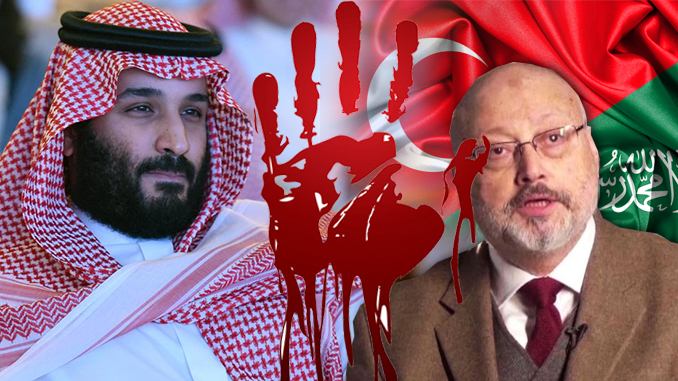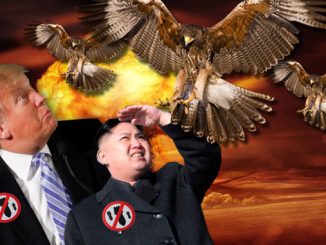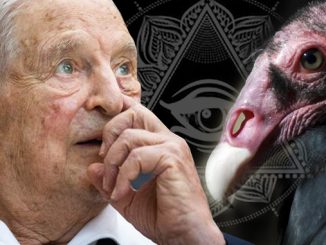
Recent behavior of the psychopathic Saudi leader Mohammed bin Salman has advocates questioning U.S. support, both from government and from the entertainment industry.
By Richard Walker
Elites in Hollywood, and in the board rooms of Silicon Valley and big media outfits in New York and Washington, will have difficulty explaining their love affair with the Saudis after reports that they kidnapped, tortured, murdered, and dismembered Kamal Khashoggi, a journalist and a permanent U.S. resident.
Khashoggi, who lived in Virginia, vanished after he entered the Saudi embassy in Istanbul on Oct. 2. As a critic of the new Saudi regime led by Prince Mohammed bin Salman, also known as MBS, Khashoggi refused to call himself a dissident.
He went to the embassy to get documents for his impending marriage, and it is now believed the Saudis lured him there with the aim of seizing him. Turkish intelligence, which monitors foreign embassies, later posted footage of him entering the building. There was no evidence he ever left it alive.
The Turks released photos of what they called a 15-man Saudi assassination team that also entered the embassy. The team had a recognized forensic expert and someone reportedly carrying a bone saw. This led the Turks to claim that Khashoggi was murdered and dismembered inside the building and his remains transferred to two private planes that flew into Istanbul that day and later left for Saudi Arabia. It was a classic hit and a tactic they have been using against Saudi dissidents in other countries.
To the astonishment of the Turks, the Saudis declared that Khashoggi left the embassy unharmed, but refused to provide video footage. They complained that their video cameras had been out of operation. Their excuse was dismissed as pure fantasy by most intelligence experts since the Saudis are very security conscious at all diplomatic facilities. In all foreign installations, non-functioning cameras trigger a top-level security alert, but that did not happen at the Istanbul embassy. The Saudis even told Khashoggi’s future wife, who had waited outside the embassy for him for three hours, that he must have passed by her without her knowing.
A few media outlets speculated that the 15-man hit team, which Turkish intelligence said included several known Saudi special forces operatives, probably intended to kidnap and rendition Khashoggi to the Saudi capital, Riyadh, but something went terribly wrong and they killed him. Turkish intelligence dismissed that theory as a wild attempt by pro-Saudi elements to deflect from the evidence.
A question lurking in the background of the abduction is what American intelligence knew. Reports indicate the CIA knew in advance about the threat to Khashoggi. If Jared Kushner, the Mideast point man, was alerted to the threat, he had a duty to warn and protect Khashoggi, who was a U.S. resident.
So what does all of this mean in terms of what we know about Saudi Arabia and its young, impetuous leader, MBS? During a two-week East to West Coast tour in March this year, he had everyone eating out of his hand. He met Hollywood moguls, the titans of Silicon Valley, and the big names in media and politics in New York and Washington. Most of all, he spent time with Trump and Kushner, and CBS’s “60 Minutes” broadcast an upbeat profile of him.
 Lost in the euphoria of his visit was a warning AFP referenced in November 2017 that MBS needed watching because he was impetuous and capable of destabilizing the Middle East. This assessment was first made in 2015 when he was Saudi defense minister. It came from the BND, Germany’s foreign intelligence agency. The warning was ignored in Washington, Paris, and London where Saudi money has always bought silence and blind loyalty.
Lost in the euphoria of his visit was a warning AFP referenced in November 2017 that MBS needed watching because he was impetuous and capable of destabilizing the Middle East. This assessment was first made in 2015 when he was Saudi defense minister. It came from the BND, Germany’s foreign intelligence agency. The warning was ignored in Washington, Paris, and London where Saudi money has always bought silence and blind loyalty.
What was even more shocking about the American elites who met him in March 2018 is that they had to know that months earlier he invited Lebanese Prime Minister Saad Hariri to Riyadh, had him arrested, and forced him to resign and make crazy claims about Lebanon in a television broadcast. The West intervened, and Hariri was eventually released. MBS then detained many of his own princes in a hotel and forced them to hand over their riches. He threatened to invade Qatar, but that was averted after American generals convinced the White House that Qatar was a valuable ally. Despite pleas from EU nations, he continued to expand his war in Yemen, slaughtering thousands of women and children and bombing food supplies and food production in the famine torn country.
Since taking over the Saudi kingdom, he has been emboldened by his personal relationship with Kushner, who has met with him privately but has never recorded what transpired at their meetings. He threatened Qatar after a meeting with Kushner, who has established links between MBS and his family friend, Israel’s Benjamin Netanyahu.
The Khashoggi affair may be a bridge too far for Western leaders, though Trump seems to be running cover for MBS, claiming that a rogue group of Saudis likely killed the journalist. It will, however, be fascinating to see if the elites in Hollywood, Silicon Valley, and New York who bought into the MBS charm offensive now have any regrets.
Richard Walker is the pen name of a former N.Y. news producer.




